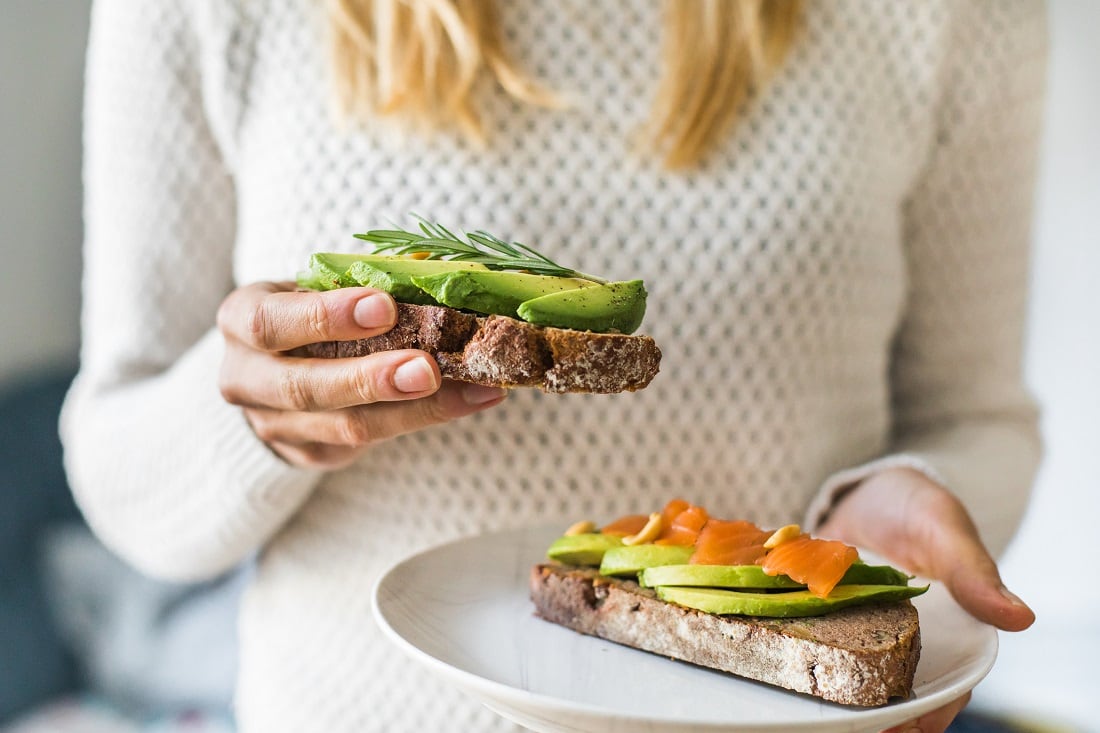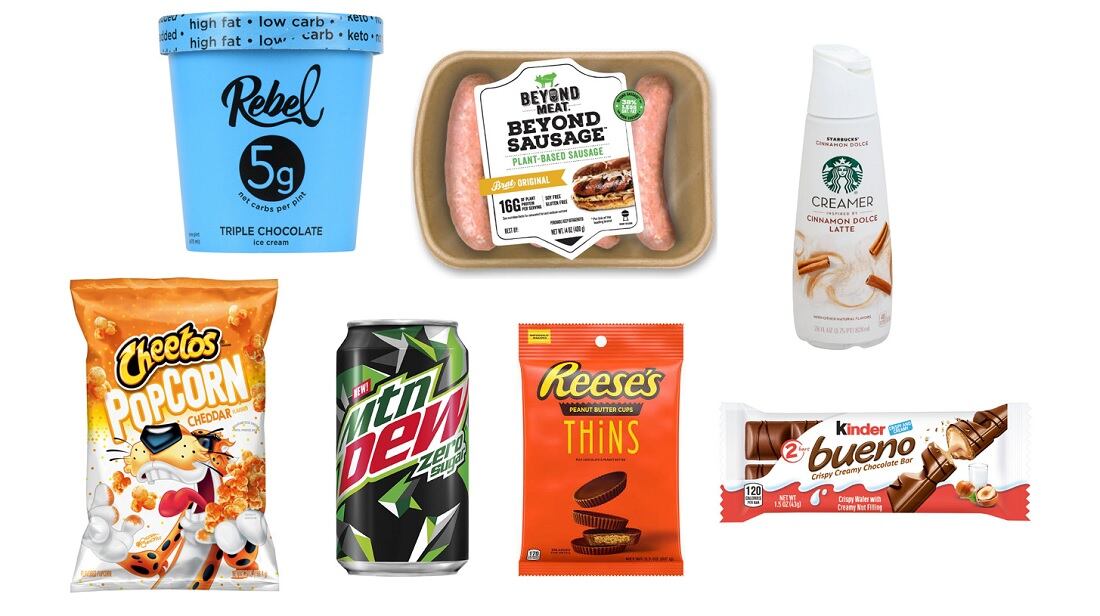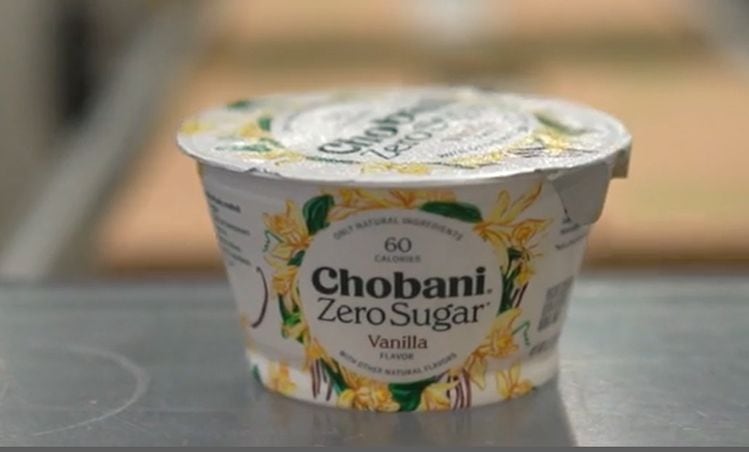According to Mintel's Global New Product Database, the number of new food and drink launches in the US touting the term 'keto' in the product description have nearly doubled within the past year from 1.2% of total food and beverage launches (for June 2019 through May 2020) to accounting for 2.3% of launches (June 2020 through May 2021), indicating continued consumer and market interest in the high-fat, low-carb diet.
And while Google search trends data suggests a cooling off in consumer interest over the past three years (see chart below), and slightly fewer Americans reported following the diet in 2021 vs 2020 according to IFIC survey data, the keto diet, like clockwork, typically sees a strong spike at the beginning of each calendar year in renewed online shopper activity, commented Lauren Gibbons, marketing director at Label Insight (now part of NielsenIQ).
"We've noticed seasonal spikes around keto. The volume of searches [on Amazon] in Q1 [2021] was up 23% compared to Q4, suggesting trends stemming from early 2021/New Year's and early spring diets," Gibbons told FoodNavigator-USA.
Top categories for searches on Amazon, said Gibbons, are breads & buns, cereal, health & recovery drinks & powders, cookies, ice cream, baking mixes and pasta with top search terms being "keto," "keto bread," "keto cereal," "keto pasta," "keto ice cream," "keto cookies," and "keto protein powder."
Yet, there could be a larger opportunity for brands to tap into the keto trend, noted Gibbons.
“We're still seeing a low number of products making the claim for ketogenic on-package, even though they qualify. Almost 98% of products that could make the ketogenic claim are not,” she said.
Keto by category
SPINS - which filtered its retail sales data by the attribute "Diet - Keto Diet" to identify products in its database that are permissible on the ketogenic diet (e.g. low-to-no net carbohydrate content as determined by nutrition analysis) found sales growth for keto products, while slightly lower in the 52 weeks ending 5.16.21 compared to the previous 52 weeks, was still registering solid numbers (+5.99% vs. +8.14%) across Natural Enhanced and Conventional Channels.
Within measured channels, some categories showed stronger growth compared to others. Frozen ice cream products with low-to-no net carbs, for instance, experienced a 1,190.32% spike to $75.3m in sales in 2020, and a more modest 34.93% bump in 2021. Plant-based frozen novelties with qualifying keto nutrition credentials, meanwhile, increased sales by nearly 100% in 2021 compared to a -47.93% decline in 2020.
Other sub-categories of traditionally carb-heavy foods in the frozen set such as frozen waffles touting low-to-net carbohydrate content had a monster year in sales (+4,4472.72% to $6.46m in dollar sales for the 52 weeks ending 5.16.21). The emerging low-to-no-net carbohydrate frozen pasta segment registered +665.99% sales growth between 2020 and 2021, albeit off a very small base.
Bars, cereals, baking mixes, cookies
What about shelf-stable bars, cereals, baking mixes, cookies, and snacks that seemed to tap into the keto trend the most in recent years? According to SPINS data, these type of products with low to net carbohydrate claims are still registering solid growth numbers.
The products with low-to-no net carbohydrate content within the shelf stable cookies and snack bar category, saw dollar sales growth of +21.31% for the measured 2021 period, over double the dollar sales growth seen in 2020. Shelf stable cold cereal products with a qualifying keto nutritional profiles also significantly notched up sales from +0.49% dollar sales growth in 2020 to +21.69% in 2021 reaching nearly $36.5m in sales across measured channels.
The shelf-stable baking ingredients segment touting low/no net carbs (including baking mixes, flours, and pancake & waffle mixes), however, saw slower growth in 2021 (+5.78% vs. +13.68%) driven by a significant drop in sales growth for flour and pancake & waffle mixes, according to SPINS data.
‘If you’re just stepping on the scale, the ketogenic diet looks great’
Originally prescribed as an alternative treatment for intractable epilepsy in children for whom medication is ineffective and a way to help control diabetes in the 19th century, the ketogenic diet is not a new concept in the medical field.
However, its efficacy as a weight loss plan, the main reason behind its recent surge in popularity, is still an emerging area of research, said Dr. Kevin Hall, lead author of a recent study which examined the effects of following a low-fat, high carbohydrate diet vs. high-fat, low-carbohydrate diets in 20 adults for two weeks.
The study was not designed as a weight loss study, but rather a way to investigate two prevailing weight loss theories: that consuming a high-fat diet leads to “passive overconsumption” of calories because one gram of fat has almost twice the calories per gram vs. protein or carbs; and the carbohydrate insulin model, which says people following a very low-fat, high-carb diet end up consuming excess calories because of spikes in insulin levels which can signal hunger, explained Dr. Hall.
“In short, we found that neither of those models of obesity held true. But specifically, the carbohydrate insulin model which predicted that more calories would be eaten – leading to weight gain – we found the opposite was true."
Both of these diets contained very few ultra-processed foods
Dr. Hall explained that despite having much larger surges of insulin and glucose after meals, those in the low-fat, high-carb diet group actually ended up eating nearly 700 calories per day less and losing more body fat than when following the high-fat diet during the study period.
However, total weight loss (i.e. pounds on the scale) during the two weeks was very similar for both diets. During the ketogenic diet phase pf the study, participants lost more weight in the first week, due to the higher amount of water weight typically shed by those on a low-carb diet, noted Hall.
“If you’re just stepping on the scale, the ketogenic diet looks great, especially over that first week because you’re eating so many calories but you’re losing so much more weight. The problem was that even in that first week when the weight loss was outpacing the low-fat diet, there was actually no change in body fat at all. Whereas in the low-fat diet, the rate of overall weight loss was slower, they were losing body fat at a much greater rate,” he said.
One caveat to note, however, is that the total amount of calories consumed among participants following the high-fat diet dropped in the second week of the diet.
“It never caught up to the low-fat diet, but it does raise the question of what if we’d done the study for another two weeks? Would they have eventually normalized to the same level of the low-fat diet?”
So what can consumers take away about weight loss and weight gain when following various diets? According Dr. Hall, an emphasis on eating whole-foods is key.
“Both of these diets contained very few ultra-processed foods. So far the only diet that’s led people to spontaneously gain weight has been a diet comprised of a high fraction of ultra-processed foods,” he said.
A useful weight loss tool?
Lawrence J. Cheskin, MD, professor and chair, department of nutrition and food studies at George Mason University, College of Health and Human Services, said as a practicing physician with a focus on weight management, he often recommends the keto diet to patients who have a significant amount of weight to lose.
“I often use it as a first try restricted diet in particular for people who need to lose a lot of weight. If somebody just needs to lose 10 lbs, then it’s less important to go on a ketogenic diet because almost anything you do for a month is going to get your weight down,” he told FoodNavigator-USA.
'If you’re eating red meat and egg yellows all day long, that’s a heart attack diet'
Patients following the high-fat diet must be vigilant on their food choices and not fall into the tempting, but common, pitfall of a enjoying a diet consisting of cheeseburgers and bacon.
“If you’re eating red meat and egg yellows all day long, that’s a heart attack diet, and we know that that’s associated with poor cardiovascular health,” said Dr. Cheskin, who advises his clients to fill their plates with foods rich in mono-unsaturated or polyunsaturated fats such as salmon, nuts, and seeds, along with non-starchy vegetables, and modest amount of high-fiber whole grains.
But even when following the core nutritional pillars of the keto diet to the letter, you still run the risk of missing out on key nutrients, said Dr. Cheskin.
“It always has the concern that you’re not going to get a full range of micronutrients, you’re not going to get essential minerals like calcium and stuff like that. There’s even been studies that show some bone demineralization if you’re on a ketogenic diet for a prolonged period. So there are downsides,” said Dr. Cheskin.
It's also not a diet he suggests as a life-long lifestyle, adding “It’s not really a natural diet and depends highly on how you do it.”




